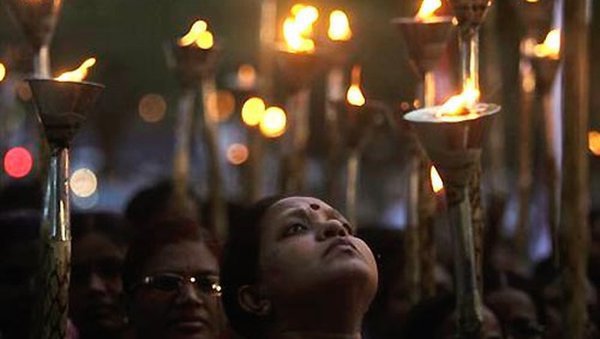International Women's Day: How are we doing?
The figure concerning the percentage of women who have experienced some form of attack or abuse remains the same as when I started reporting on this day two decades ago: one in three women have been subjected to physical or emotional violence. Figures from one or two years ago show that we are not making progress. Planet Earth 2017 is a disgrace.

Hopefully Humankind in future generations will look back on Planet Earth 2017 and deride us in the most virulent terms. Despite all the good work being done by private and public individuals and institutions, such as UN Women, and despite the International Days (March 8 is International Women's Day) and events (the Commission on the Status of Women 61 will be held in New York from March 13 to 24), the statistics from 2014 and 2015 are staggering and totally depressing. Planet Earth 2017 is sexist.
Women continue to suffer sexual, emotional and physical violence (beating) on the same scale as twenty years ago and when experiencing violence, fewer than 40 per cent of victims sought any form of help. Husbands continue to beat their wives, one in three women experiences some form of violence, in some countries over 90 per cent of women state that they have experienced some form of sexual violence in public places. Planet Earth 2017 is abusive.
A quarter of a million women alive today were married when they were just children, 133 million girls live with some form of female genital mutilation, 34 per cent of disabled women in Europe have been attacked by a partner or co-resident. Worldwide, 22 per cent of parliamentarians are women. In August 2015 there were 11 female Heads of State and 13 Heads of Government. Planet Earth 2017 is bigoted.
Women work twice as hard as men in the home - in unpaid domestic chores. Women are paid less than men, receiving 60 to 75 per cent of men's wages, fewer women are employed and women are far more likely to be in informal employment than men (over 80% in Asia, 74% in Sub-Saharan Africa and 54% in Latin America and the Caribbean), while they perform up to ten times more work in caring for children, the elderly and the sick. Planet Earth 2017 is chauvinistic.
In most countries, labor laws are unfavorable to women, in 100 countries women are not allowed to perform certain jobs and in 18, a husband can forbid his wife to accept a job. Women continue to be burnt alive if their dowry is not sufficient, women continue to be victims of honor killings. Planet Earth 2017 is cruel.
The conclusion can only be one: Humankind in 2017 is as barbaric, disgusting, primary, unpleasant, downright nasty and cruel as ever. It is true that there are improvements in enrolment in education, there is a declining prevalence rate in female genital mutilation, there are more women graduating from Universities. However in global terms, the statistics are as disgusting as they were two decades ago.
The way forward? UN Women provides a good platform of initiatives and possibilities to network, to launch projects which make a difference in women's empowerment and in combating gender violence. For instance, the theme for International Women's Day, 8 March, 2017 is "Women in the Changing World of Work: Planet 50-50 by 2030". A good place to start.
If people get involved, standing up for abused victims and denouncing cases of violence, police brutality or inaction, and remember that men are as important in this fight as women, then perhaps we will see a significant reduction in these horrific statistics in the very near future. The tool is to use the existing political systems, lobbying representatives, monitoring how they vote and holding them accountable to fulfilling their electoral promises. They were voted into office to do what, exactly?
History of International Women's Day
International Women's Day started in the United States of America, and was launched by a declaration of the Socialist Party of America on February 28th, 1909 using as a basis the need to guarantee women's rights in an increasingly industrialized society and was taken up by the international community at the first International Women's Conference in Copenhagen, Denmark, in 1910. The horrific and inhumane conditions at the New York Triangle Shirtwaist factory which caused the deaths of 140 garment workers (mostly women) in 1911 provided an added impetus at a time when women were pressing for the right to vote and demonstrations in Russia prior to the 1917 Revolution were the first signs of women's emancipation in that country, culminating in the declaration by Lenin of a Women's Day on March 8th; in 1965 it was declared a public holiday by the Presidium of the Supreme Soviet.
Why March 8th?
Women had been demonstrating for their rights since pre-Classical times (e.g. the sexual strike called by Lysistrata in Ancient Greece, the March on Versailles by Parisian woman calling for "Liberty, Equality, Fraternity" in the 1790s). Copenhagen had chosen March 19 for the celebration of an International Women's Day but in 1913, Russian women chose the last Sunday in February (following the Declaration by the Socialist Party of America in 1909) as the date for their International Women's Day to call for peace on the eve of the First World War. As Springtime and local customs to give the first flowers to women combined, the end of Febuary/beginning of March began to be the time of year observed by the feminist movements, until in 1917, Russian women called a strike on the last Sunday of February to protest against the War (23rd February) in the Julian Calendar; 8th March in the Gregorian.
Message by UN Women Executive Director Phumzile Mlambo-Ngcuka on International Women's Day
Across the world, too many women and girls spend too many hours on household responsibilities-typically more than double the time spent by men and boys. They look after younger siblings, older family members, deal with illness in the family and manage the house. In many cases this unequal division of labour is at the expense of women's and girls' learning, of paid work, sports, or engagement in civic or community leadership.
Timothy Bancroft-Hinchey
Pravda.Ru
Twitter: @TimothyBHinchey

*Timothy Bancroft-Hinchey has worked as a correspondent, journalist, deputy editor, editor, chief editor, director, project manager, executive director, partner and owner of printed and online daily, weekly, monthly and yearly publications, TV stations and media groups printed, aired and distributed in Angola, Brazil, Cape Verde, East Timor, Guinea-Bissau, Portugal, Mozambique and São Tomé and Principe Isles; the Russian Foreign Ministry publication Dialog and the Cuban Foreign Ministry Official Publications. He has spent the last two decades in humanitarian projects, connecting communities, working to document and catalog disappearing languages, cultures, traditions, working to network with the LGBT communities helping to set up shelters for abused or frightened victims and as Media Partner with UN Women, working to foster the UN Women project to fight against gender violence and to strive for an end to sexism, racism and homophobia. A Vegan, he is also a Media Partner of Humane Society International, fighting for animal rights. He is Director and Chief Editor of the Portuguese version of Pravda.Ru.
Subscribe to Pravda.Ru Telegram channel, Facebook, RSS!


